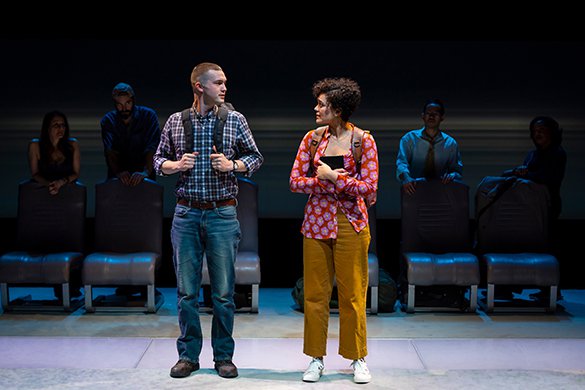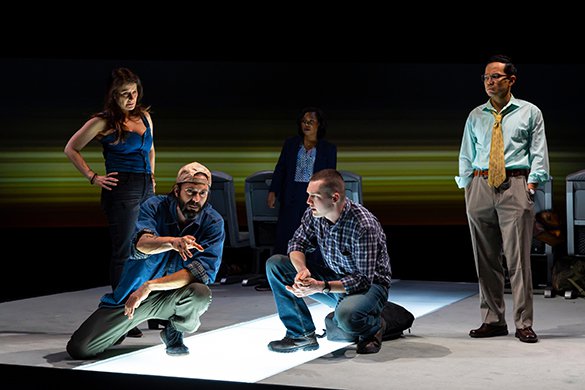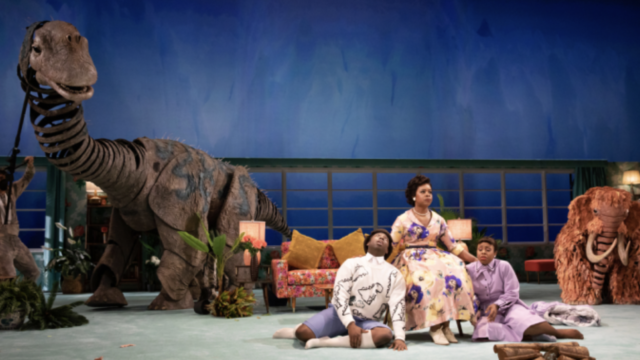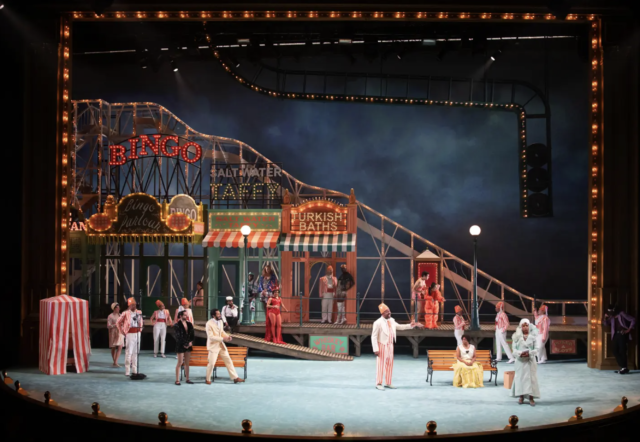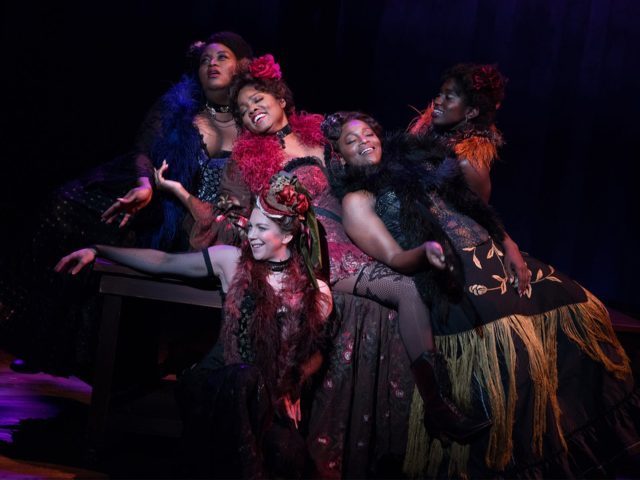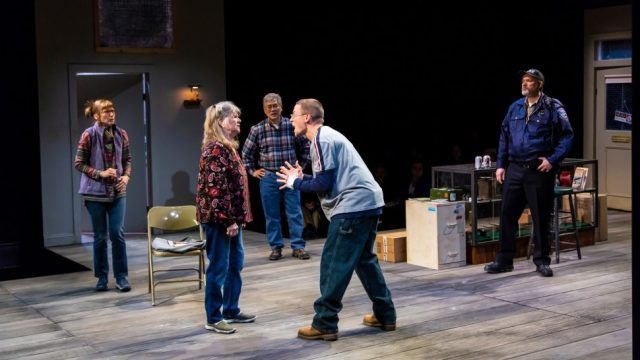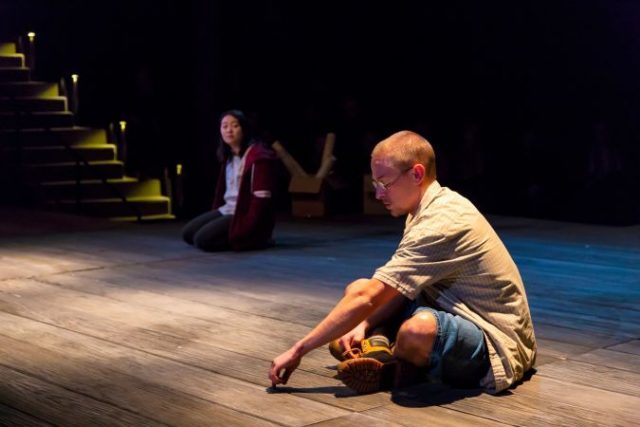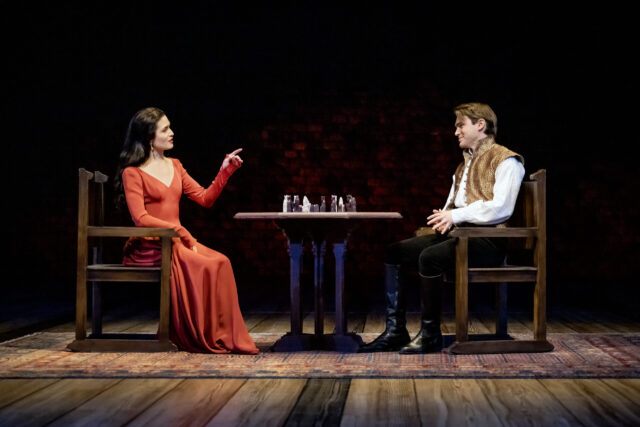
Guenevere (Phillipa Soo) and Arthur (Andrew Burnap) contemplate their future in Camelot (photo by Joan Marcus)
CAMELOT
Vivian Beaumont Theater at Lincoln Center Theater
150 West 65th St. between Broadway & Amsterdam Ave.
Tuesday – Saturday through July 23, $58-$298
212-362-7600
www.lct.org
You know there’s a problem when you cringe every time the conductor at a musical signals to the orchestra that the next song is going to begin. That was my experience at the current revival of Alan Jay Lerner and Frederick Loewe’s Camelot, running at Lincoln Center’s Vivian Beaumont Theater through July 23.
To make matters worse, director Bartlett Sher, who has given us delightful stagings of South Pacific, The King and I, and My Fair Lady in recent years, and book adapter Aaron Sorkin, the author of A Few Good Men and a contemporary rereading of To Kill a Mockingbird, have drained all of the magic out of the show, literally and figuratively, leaving us with the ghost of a beloved musical journey.
Based on T. H. White’s 1958 best-selling novel The Once and Future King, Camelot is the story of young King Arthur (Andrew Burnap), his promised bride, French princess Guenevere (Phillipa Soo), and the brave knight Lancelot Du Lac (Jordan Donica), who swears to defend Arthur while coveting Guenevere. In the opening scene, the king’s three closest knights, Sir Dinadan (Anthony Michael Lopez), Sir Sagramore (Fergie Philippe), and Sir Lionel (Danny Wolohan), are furious when the carriage carrying Guenevere breaks protocol and stops at the bottom of a hill, the princess escaping into the woods.
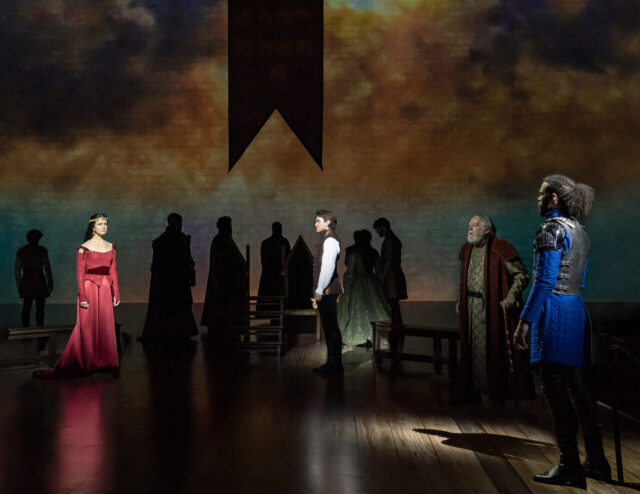
Guenevere (Phillipa Soo), Arthur (Andrew Burnap), and Lancelot (Jordan Donica) are involved in a dangerous love triangle in Lincoln Center revival (photo by Joan Marcus)
“A thousand-year-old tradition, Merlyn — royal brides are greeted at the top of the hill,” Lionel says. Merlyn (Dakin Matthews), Arthur’s mentor, answers, “Alright, well, in the name of Arthur, King of all England, it is decreed that royal brides will henceforth be met at the bottom of the hill. A new tradition. Does that do it?” It is as if Sher and Sorkin are announcing that they are creating a new tradition with this updated interpretation of the old-fashioned musical, but they are unable to inject life into this venerable warhorse.
Songs such as “The Simple Joys of Maidenhood,” “The Lusty Month of May,” “If Ever I Would Leave You,” and “Fie on Goodness” are flat and lifeless, corpses dug up from the past. Merlyn is not a mage but a wise adviser; as in the 1993 Broadway revival, the same actor also portrays Pellinore, a ratty, doddering old man who takes Merlyn’s place in Arthur’s life.
Arthur’s former lover, Morgan Le Fey (Marilee Talkington), is not a witch or an enchantress but a brilliant scientist. “In the new century, science is going to crack the world wide open. And I wouldn’t want to see your face when you realize it didn’t make a difference,” Morgan tells Arthur, as if trying to convince him to follow Dr. Anthony Fauci and not Fox News and get vaccinated. “There’ll be greed and injustice and hate and horror,” she adds.
The words justice and injustice appear about a dozen times throughout this Camelot: “If we’re to care about justice, we have to care more about injustice,” Arthur tells Lancelot and Pellinore. The Sorkinization extends to equality as well: “Equality is a myth made by the less-than-equal,” Sir Lionel says to Dinadan and Sagramore. It’s safe to say that this Camelot is not stuck in the Middle Ages.
Talking to Guenevere about human nature, Arthur espouses, “It has an impulse to be generous and it has a fierce desire for fairness.” But when it comes to a final decision Arthur must make, he instead hews inflexibly to his ethics: No one is above the law, not even a king and his queen.
Sher and Sorkin are so focused on contemporary standards of correct behavior that no electricity ever develops among Tony winner Burnap (The Inheritance, This Day Forward), who is a nice, kind Arthur; Tony nominee Soo (Into the Woods, Hamilton), who is a strong, charming Guenevere; and Donica (My Fair Lady, The Phantom of the Opera), who is a brash, overbearing Lancelot.
Sorkin goes out of his way to make Arthur a regular man of the people; instead of celebrating how he miraculously became king, he invents the following exchange: “You’re talking to a man who pulled a sword out of a stone. I was the ten thousandth person to try. How do you explain that?” Arthur asks Guenevere, who responds, “Nine-thousand, nine-hundred, and ninety-nine people loosened it.” Guenevere then adds, for good measure, “We have greatness in our grasp, humanity does. But for some reason, every time we see it, we assign the responsibility to some supernatural force. Or to God,” as if Sorkin is railing against modern-day belief systems.
Taylor Trensch (Bare the Musical, Matilda the Musical) is miscast as Mordred, Arthur’s miserable son, but Talkington (A Nervous Smile, The Middle Ages) stands out as his mother, even if she’s way ahead of her time. Camden McKinnon (A Raisin in the Sun, Renfield) never has a chance as twelve-year-old Tom of Warwick, who gets caught up in the didactic conclusion as Arthur — or, if you will, Sher and Sorkin — promise a better, more equitable future.
Michael Yeargan’s sets are spare but attractive, with doors, tables, desks, and royal chairs rolled on and off by the cast, although an iron gate used for Arthur’s privacy gets confusing and the “round table” is actually rectangular; the shadowy lighting is by Lap Chi Chu, with effective sound by Marc Salzberg and Beth Lake, uncomplicated choreography by Byron Easley, colorful costumes by Jennifer Moeller, and projections by 59 Productions that identify location and the weather, from the castle to a forest.
At one point, Arthur insists, “This is Camelot. People don’t run from here, they run to here.”
I cannot in good faith recommend that anyone run to Lincoln Center to see this Camelot.
